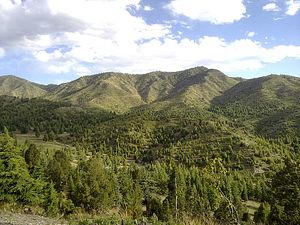In an unprecedented show of unity and a rare parliamentary consensus, the National Assembly (NA) of Pakistan has voted to merge the country’s tribal districts, known together the as the Federally Administrated Tribal Areas (FATA), with the province of Khyber Pakhtunkhwa (KP). The merger of the region comes at a time when the current Pakistan Muslim League-Nawaz (PML-N) government has almost completed its constitutional term in office. While it’s encouraging to see all major political parties coming together to support FATA’s regulation, the smooth sailing of the legislation was ultimately the result of a combination of institutional and political interests coming into alignment rather than a decision borne of political conviction.
The country’s ordinary governance structures do not apply to the tribal districts, as they have been governed through a colonial-era legal regime, the Frontier Crimes Regulation (FCR). Efforts to merge FATA with KP have existed for decades. However, previous attempts never found consensus. Reforms have most often been undermined by political conflicts, watering down most governments’ preliminary proposals. On the other hand, the military in Pakistan has seldom offered its support for any political process aimed at extending the country’s constitutional structures to FATA. This has largely been due to the region’s importance in Pakistan’s regional security policy, which for all the right and wrong reasons, has benefited from the FATA’s lawlessness – a direct result of nonexistent constitutional structures there.
Nonetheless, this doesn’t mean that Pakistan’s military has never made efforts to normalize the region. Pakistan’s former president, General Pervez Musharraf, did consider “integrating FATA into Pakistan’s ordinary governance structures by extending the geographical scope of some version of the Local Governance Ordinance of 2001 as well as of the Political Parties Act of 2002.” A number of analysts note that there is a growing desire in the military to mainstream the FATA region. The army fears that “without a serious effort to extend the full writ of Pakistani law to the FATA, the area would never be pacified.”
For the Pakistani military, there are two reasons to support the extension of Pakistan’s constitution to the region in its entirety. First, the military understands that if Pakistan is to consolidate on the counterterrorism gains that it has made over the last few years, FATA should become a region that is fully regulated. The presence of local governance mechanisms can only ensure that militants remain isolated and their ability to penetrate the region is constantly challenged.
Second, the pressure created by the Pashtun Tahafuz Movement (PTM) cannot be ignored. The PTM has criticized the military for its heavy-handed approach in terms of dealing with ethnic Pashtuns living in Pakistan’s tribal areas. The movement has attracted strong support internationally and successfully built a narrative that accuses the military’s heavy presence as a reason for the region’s ill-treatment. While the military may have been planning to ensure FATA’s regulation, the pressure generated by PTM has only expedited the process.
Under current circumstances, where the PTM is challenging the military’s influence in the country, it’s all the more important for the military to regulate FATA in an effort to take away PTM’s power. “The extension of constitutional rights to FATA is a positive development. However, PTM remains above the debate on FATA merger as it is against those who don’t respect constitution & courts. Still is a long way to go,” said one of the PTM leaders in a statement.
All major political parties that have signed onto the FATA merger bill have done it to ultimately tap into the Pashtun ethnic vote bank. The merger happened with the next general election only months away. It’s significant to note all efforts aimed at merging FATA into KP during the last five years have failed due to political parties’ inability to find consensus on the issue.
It not clear whether the regulation of FATA means that Pakistan is changing its regional security policy, however. Historically, Pakistan’s military has preferred a porous border with Afghanistan. The impending progress in FATA, which is likely to accelerate after the region’s merger with KP, will surely bring stability and security along the Durand Line, which is essential to not only restore stability in Pakistan but also for the region in general.

































